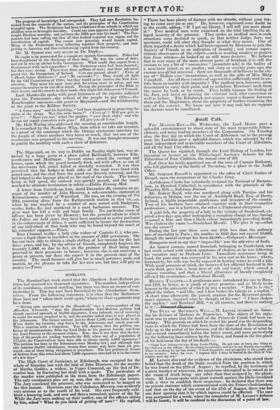SCOTLAND.
The Standard last week stated that the Aberdeen Anti-Reform pe- tition had received ten thousand signatures. The number, independent of its roundness, seemed startling, but there was then no means of con- tradictim"r' it. This has now hem] furnished by the Aberdonians them- selves. From the following statement, it is clear that the Reformers there have not " taken their word again," whatever their opponents may have done.
"Having seen mentioned in the Standard," says a correspondent of the Aberdeen Chronicle, " that the Aberdeenshire Anti-Reform petition had already received upwards of 10,000 signatures, I was induced, out of curiosity;' to count the names attached to it, and the number added since it was placed in the Athenwum. The former amount just to about 1,540, and the latter to 24. If you doubt my veracity, step down to the Athena:um and satisfy yourself: This is reaction with a vengeance. You will observe, that the petition em- braces all denominations, from my Lord Duke to his poorest tenant, and from
i
my Lord Provost to the meanest citizen. Now, does t not show that the feel- ings of the people are cooling towards the Bill, when out of a population of 177,651, the Conservatives have been able to obtain nearly 1,600 signatures ? The petition has been in the Athenwum since Monday last; and although this city contains 58,019 inhabitants, twenty-four names only have been yet pro- cured—ten of these being clergymen or preachers. The last petition in favour of Reform from this town had about 7,000 signatures attached to it in the course of a few days."
The High Court of Justiciary, at Edinburgh, was occupied for the whole of Saturday last with the trial of John Howison, for the murder of Martha Geddes, a widow, in Upper Cramond, on the 2nd of De- cemberlast, by fracturing her skull with a spade. The particulars of the murder were published at the time, from the Edinburgh papers. The only exculpatory plea set up was, that the prisoner was insane. The Jury convicted the prisoner, who was sentenced to be hanged on the 21st instant. Howison, says the Caledonian Mercury, was evidently very anxious as to the result of his trial. His eyes frequently exhi- bited a knowing look, and now and then a tremulous quiver of the lip. While the Jury were making up their verdict, one of the officers sitting by him, asked " What do you think of getting off now?" He replied, "There has been plenty of doctors with me already, without your try- ing to come over me as one." He, however, expressed some doubt as to the result, adding, "If I get my liberty, I will tell you more about it." Two medical men were examined on the trial touching the al- leged insanity of the prisoner. They spoke; as medical inen in such situations seem destined to speak, so that neither Judge, jury, nor spectator, could tell what they thought or what they meant. One of them regarded a desire which had been exposed by Howison to join the Society of Friends as an indication of insanity ; and certain super- stitious observances of the culprit—such as wearing amulets to protect him from witches—he looked on as still more decisive. We believe that in very many of the more obscure parts of Scotland, it is still the custom to sew a bit of" rowan-tree" [mountain ash] in the bodice of a new-born infant, as an amulet; and sixty or seventy years ago, the custom was all but universal : there are thousands of believers in the vir- tue of" Hallow e'en" incantations, as well as the gifts of Miss Mary Campbell. Are all these votaries of superstition sufficiently mad to en- title them to murder with impunity ? The medical men, however, seem. determined to carry their point, and to withdraw Howison's neck from the noose by hook or by crook. They boldly impugn the finding of the Jury, and insist on proving the criminal mad, after conviction as well as before. The Edinburgh newspapers report a 'dispute between them and the Magistrates, about the propriety of further examining the acts of the convict. We know not how it may end, but we suppose the doctors must be conciliated.






























 Previous page
Previous page